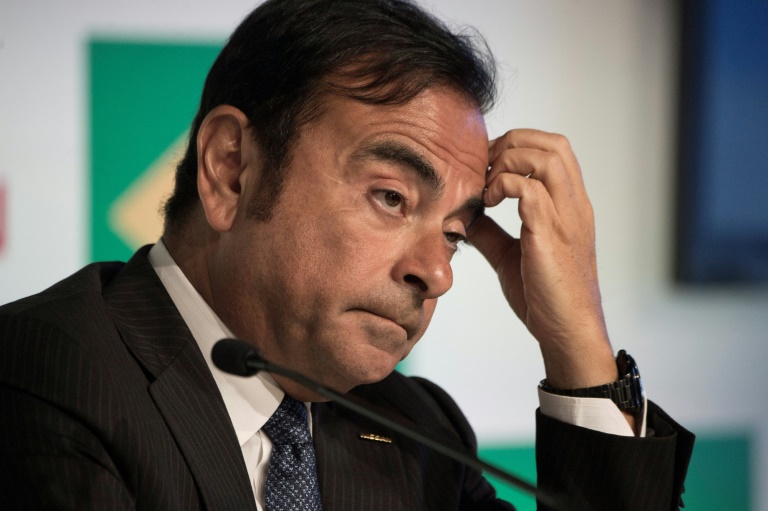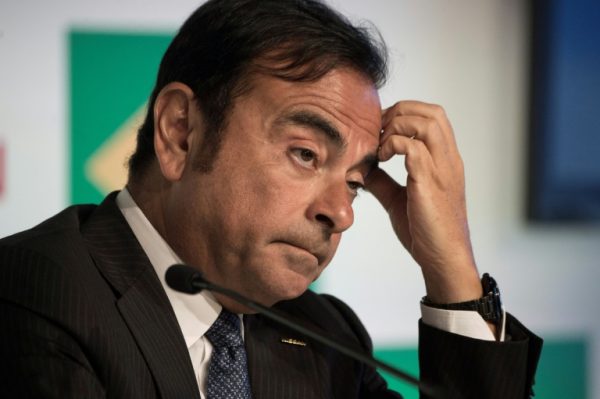 As Japanese gear up for the changing of the guard at Tokyo’s Imperial Palace, another palace coup is grabbing headlines globally and forcing Japan Inc. to look in the mirror.
As Japanese gear up for the changing of the guard at Tokyo’s Imperial Palace, another palace coup is grabbing headlines globally and forcing Japan Inc. to look in the mirror.
The upheaval in question is at Nissan Motor headquarters in Yokohama, where Carlos Ghosn was arrested Monday in dramatic fashion. The driving force behind the triple alliance between Renault, Nissan and Mitsubishi Motors allegedly underreported his income and misused company resources.
At a press conference that evening, Ghosn’s hand-picked successor at Nissan, CEO Hiroto Saikawa, was pressed on “coup d’etat” talk. “That is not my understanding,” he said, blaming Ghosn’s downfall on “series misconduct.”
We’ll see. One person who surely lacks understanding is French President Emmanuel Macron, whose government owns 15% of Renault. Macron has been trying to sell his people on the merits of capitalism and global investors on his economy. Yet spare a thought, too, for Shinzo Abe, whose six-year plan to raise Japan’s game just skidded into a ditch along with the nation’s second-largest automaker.
Though deflationary forces remain, Abenomics could claim improved corporate governance as a major reform win. Steps to internationalize management practices and increase transparency, Prime Minister Abe’s team claims, are reanimating Japan’s animal spirits. But that was before yet another Japan Inc icon got caught asleep at the wheel.
Nissan joining the corporate parade of shame tells a bigger story about why Abenomics is stuck in second gear.
This isn’t Nissan’s first brush with controversy in 2018. In July, it was implicated in a vehicle-inspection scandal that’s roped in Mazda Motor, Subaru Corp, Suzuki Motor and Yamaha Motor.
Still, Ghosn’s troubles are yet another embarrassing example of how Japan Inc answers to no one, a controversy garnering breathless global media coverage.
News cycle
The news cycle shows much of the old ways remain: the drip-drip-drip of bad news from Tokyo Electric Power’s cleanup efforts in Fukushima; Takata CEO Shigehisa Takada still having a job after 20 deaths worldwide allegedly from faulty airbags; fudged data at Kobe Steel; shenanigans at earthquake shock-absorber maker KYB Corp.
The kneejerk reaction to Ghosn’s arrest has many wondering if gaijinCEOs can get a fair shot in Japan. Ghosn, a globe-trotting Brazilian-born, Lebanese-raised Frenchman, personifies the idea of the “Davos Man.” His Nissan turnaround feat also made him as fabled and celebrated a chieftain as you’ll find in Japan.
He even inspired a manga comic series.
One reason for the conspiracy theories: massive accounting frauds at Olympus and Toshiba didn’t land Japanese executives in jail the way it did Ghosn and fellow Nissan director Greg Kelly. The same with executives at Takata and Tepco putting lives at risk.
In 2011, when then-CEO Michael Woodford blew the whistle on a US$1.7 billion accounting fraud at Olympus, shareholders seemed angrier about him going public than the underlying fraud. Woodford, a British national, was quickly shown the door.
Long-time Japan crime writer Jake Adelstein argued Ghosn shows how Japan Inc “scapegoats” foreigners in belated anti-corruption efforts in a Daily Beast column.
Yet if the case prosecutors are bringing is valid, Nissan’s internal controls – and auditors – failed to notice Ghosn fudging his income statements for at least five years. This raises an obvious question: Huh?
The chronic disarray that inflicts Japan Inc is a roadblock for Abe’s six-year-old reflation push. Abenomics has three “arrows” aimed at reviving demand: monetary easing, fiscal loosening and structural reforms. The first two have been aloft for years; the third arrow, not so much.
Corporate bonds
The main upgrades have been a 2015 United Kingdom-like stewardship code and steps to make it easier for shareholders to pressure underperforming corporate boards. Nissan was among the many companies who flouted the code. Team Ghosn figured it knew better.
Abe’s easy-money, weak-yen policies boosted profits and the Nikkei 225 Stock Average, the latter by 114% on his watch. Missing, though, is the virtuous cycle of wage gains needed to generate stable growth and service the world’s biggest debt burden.
A 0.4% drop in inflation-adjusted real wages in September from a year earlier followed a 0.7% decline in August. Such a trajectory bodes ill for consumer spending and the Bank of Japan’s reaching its 2% inflation goal. Cash-rich companies are hoarding profits rather than sharing them with workers. Why? Because they can.
One missing link is a lack of confidence in the future. Another is inefficiencies at all levels of corporate Japan. Productivity is lagging, innovation underwhelming and groupthink that stymies change as pervasive as ever.
Until companies streamline operations and break with the rigid practices of the past, they won’t be the engine of growth and wage gains Tokyo needs to thrive anew.
Nissan is but the latest example of how an insular and opaque corporate system feeds and perpetuates dysfunction. That is despite the fact it’s been run by a charismatic non-Japanese for nearly two decades.
In his Monday press performance, CEO Saikawa railed against Ghosn’s long-reign and imperiousness. Saikawa even seemed to suggest Ghosn fancied himself Nissan’s emperor at a time when Japan’s real one, Akihito, prepares to abdicate. A better, more diverse board might have reined Ghosn in.
But Nissan is a microcosm of a bigger problem. Just as it takes a proverbial village to raise a child, it takes an inward-looking system to enable a TEPCO, a Takata, an Olympus and a Nissan impervious to the rapidly changing global economy.
If you want to know why Tokyo isn’t getting more traction with Abenomics, you’ll find ample clues in Yokohama.
ASIA TIMES


Leave a Reply
You must be logged in to post a comment.